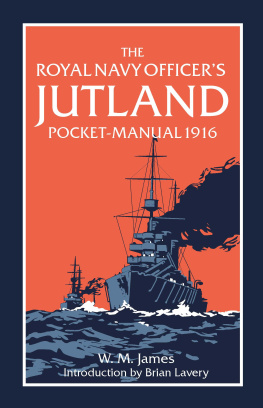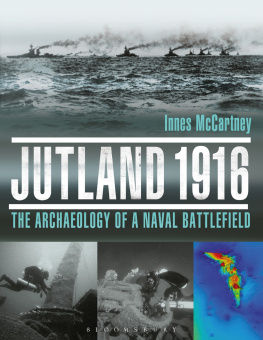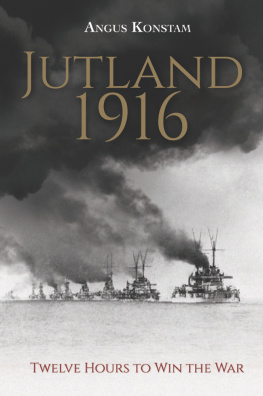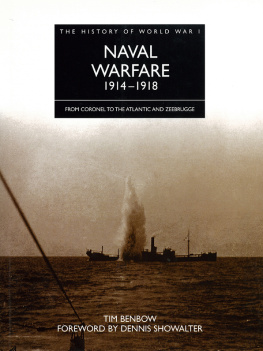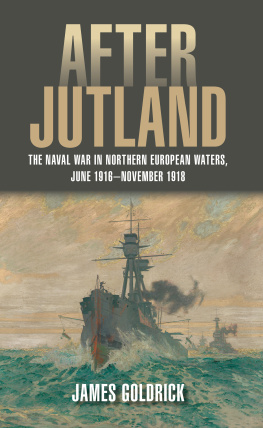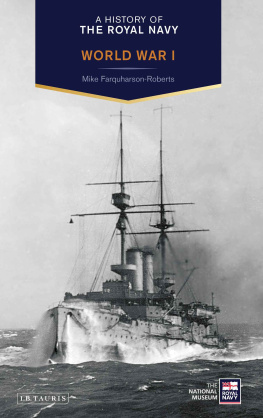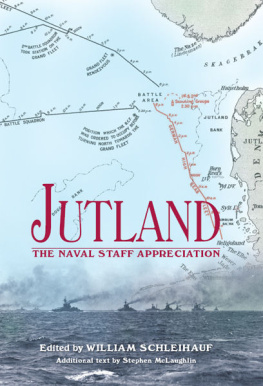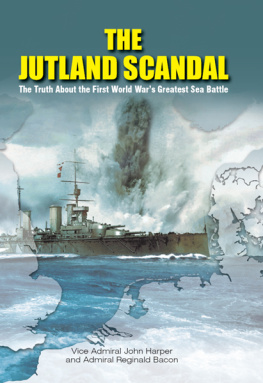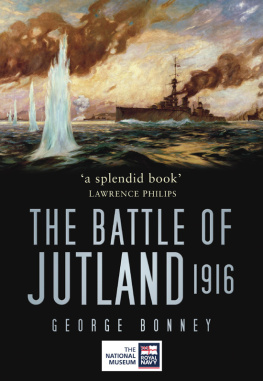W.M. James - The Royal Navy Officers Jutland Pocket-Manual 1916
Here you can read online W.M. James - The Royal Navy Officers Jutland Pocket-Manual 1916 full text of the book (entire story) in english for free. Download pdf and epub, get meaning, cover and reviews about this ebook. year: 2016, publisher: Pool of London Press, genre: Romance novel. Description of the work, (preface) as well as reviews are available. Best literature library LitArk.com created for fans of good reading and offers a wide selection of genres:
Romance novel
Science fiction
Adventure
Detective
Science
History
Home and family
Prose
Art
Politics
Computer
Non-fiction
Religion
Business
Children
Humor
Choose a favorite category and find really read worthwhile books. Enjoy immersion in the world of imagination, feel the emotions of the characters or learn something new for yourself, make an fascinating discovery.
- Book:The Royal Navy Officers Jutland Pocket-Manual 1916
- Author:
- Publisher:Pool of London Press
- Genre:
- Year:2016
- Rating:5 / 5
- Favourites:Add to favourites
- Your mark:
- 100
- 1
- 2
- 3
- 4
- 5
The Royal Navy Officers Jutland Pocket-Manual 1916: summary, description and annotation
We offer to read an annotation, description, summary or preface (depends on what the author of the book "The Royal Navy Officers Jutland Pocket-Manual 1916" wrote himself). If you haven't found the necessary information about the book — write in the comments, we will try to find it.
W.M. James: author's other books
Who wrote The Royal Navy Officers Jutland Pocket-Manual 1916? Find out the surname, the name of the author of the book and a list of all author's works by series.
The Royal Navy Officers Jutland Pocket-Manual 1916 — read online for free the complete book (whole text) full work
Below is the text of the book, divided by pages. System saving the place of the last page read, allows you to conveniently read the book "The Royal Navy Officers Jutland Pocket-Manual 1916" online for free, without having to search again every time where you left off. Put a bookmark, and you can go to the page where you finished reading at any time.
Font size:
Interval:
Bookmark:
THE
ROYAL NAVY OFFICERS
JUTLAND
POCKET-MANUAL 1916
First published in 1916 as New Battleship Organisations
This edition published in Great Britain in 2016 by
The Pool of London Press
A Division of Casemate Publishers
10 Hythe Bridge Street
Oxford 0X1 2EW, UK
www.pooloflondon.com
The Pool of London Press 2016 Introduction Brian Lavery 2016
All rights reserved. No part of this book may be reproduced or transmitted in any form or by any means, electronic or mechanical including photocopying, recording or by any information storage and retrieval system, without permission from the publisher in writing.
A CIP record for this book is available from the British Library
Hardcover edition: ISBN 978-1-910860-18-2
epub: 978-1-910860-24-3
Mobi: 978-1-910860-25-0
Printed in the Czech Republic by FINIDR s.r.o..
To receive regular email updates on forthcoming Pool of London titles, email with Pool of London Updates in the subject field.
For a complete list of Pool of London Press and Casemate titles, please contact:
CASEMATE PUBLISHERS (UK)
Telephone (01865) 241249
Fax (01865) 794449
Email:
www.casematepublishers.co.uk
THE
ROYAL NAVY OFFICERS
JUTLAND
POCKET-MANUAL 1916
First published as
New Battleship Organisations
AND NOTES FOR EXECUTIVE OFFICERS
BEING EXTRACTS FROM A NOTEBOOK, KEPT BY THE AUTHOR DURING THE LAST FOUR YEARS, ON NOVEL METHODS OF ORGANISATION, INTERNAL ECONOMY AND SEAMANSHIP
Commander WM. James, R.N.
Introduction by Brian Lavery

The Pool of London Press is a new publisher inspired by the rich history and resonance of the stretch of the River Thames from London Bridge downriver to Greenwich. The Press is dedicated to the specialist fields of naval, maritime, military and exploration history in its many forms. The Press produces beautifully designed, commercial, non-fiction volumes and digital products of outstanding quality for a dedicated readership featuring strong narratives, magnificent illustrations and the finest photography.
INTRODUCTION
by Brian Lavery
S ome might say that William Milbourne James led a charmed life. His good looks - which he retained all his life - inspired his grandfather Sir John Everett Millais to paint him and it was used as an advertisement for Pears Soap, which earned his nickname of Bubbles. Even in his fifties an official report described his disposition as peculiarly sunny and lovable and that is reflected in the title of his autobiography The Sky was Always Blue. He entered the navy at the age of 13 by the training ship Britannia in 1895, and at the beginning of 1913 he gained the vital promotion to commander. He might have become second-in-command of an old cruiser, but instead he was appointed to the battle cruiser Queen Mary, building in Palmers yard on Tyneside and one of the most glamorous ships in the navy. In that post he would be expected to allocate men to the great variety of duties to be done on board.
Admiral Jacky Fisher had shaken up the navy after its long Victorian slumber, reforming the training of officers, recalling ships from imperial policing and scrapping many of the older ones, and building the Dreadnought, the prototype for a new class of battleship. But his favourite ship was the battle cruiser, with heavy guns like the battleship, but higher speed and lighter armour - eggshells armed with sledgehammers as he put it. He had intended them to seek out French commerce raiders on the high seas, but now that Germany was the prospective enemy they were to be used as a scouting force for the Dreadnoughts. The Queen Mary was the sixth to be built and the third with 13.5 instead of 12-inch guns and a slight improvement on the Lion and Princess Royal which were just entering service. Like them, the Queen Mary had a speed of 27 knots, which demanded huge engines of 75,000 shaft horsepower. Despite plans to change the navy over to oil fuel, they were fed by coal, which demanded an enormous complement of stokers - 526 out of 1017 men on board were in the engineering branch and 471 of these were unskilled or semi-skilled stokers. They could be a problem since they were recruited as adults unlike the seamen who were usually broken into naval discipline as boys, and the great expansion of the navy had led to a lowering of standards. On the other hand, the new First Lord of the Admiralty, Winston Churchill, had given the sailors their first pay rise for half a century and abolished some of the more degrading punishments. Lionel Yexley the lower deck champion hailed it as The abolition of discontent in his newspaper The Fleet, but perhaps it was less satisfying to the man on the messdeck.
Captain William Reginald Blinker Hall was appointed to command the ship in July 1913. James had served with him in the cruiser Natal and knew him as a brilliant, innovative but difficult officer. Two years ago the Agadir Crisis had convinced almost everyone that war with Germany was highly likely - and indeed the Queen Mary herself was part of the arms race which accelerated the process. Therefore Hall told James that being certain war was not far off, he wished my peace-time organization for the ships company to be the same as the organization for war.1 This was to be done by dividing the crew into three watches, called red, white and blue instead of the traditional port and starboard, so that the men would get enough rest during constant patrols and sweeps.
Only 250 of the Queen Marys crew were seamen, and 113 of these were trained gunners to operate six 13.5 and 12.4-inch guns (the marines operated the others). Halls answer was to use stokers to assist the guns crews when needed, mostly in the magazines. The most radical of Halls ideas was that the ship was to do without police - the master at arms and ships corporals. Hall reasoned that petty officers were now of a far higher standard, and that police absolved them from responsibility for the conduct of the ships company. This was criticised by Yexley, surprisingly since he had written about police corruption in the past.2 James invited him on board and he was soon full of praise. James does not specifically suggest the absence of police in New Battleship Organisations, as other ships still had them, but he by-passes them with his notes on Departmental Control of a Ships Company.3 Other innovations included laundries instead of dhobying or washing by hand, a newspaper shop, cinema projector (silent in those days) and a chapel, all of which are described. The section on recreation reflects the fact that seamen no longer got exercise in climbing masts as in the days of sail. The ship carried 3550 tons of coal which had to be stowed by hand as soon as she returned from the sea. William Broadway describes his role. Us signal boys used to supply the bags and it did depend on what duty you were on. After coal ship you had to clean up and have a bath and there was absolutely no room as everyone wanted one at the same time. your coaling rig you used to bundle up and stow somewhere and then wash it whenever you could. He was much happier when the ship went to St Petersburg and he looked over the Tsars palace.4
In July 1914 Queen Mary sailed from Portland to Scapa Flow and was anchored there when war began on 4 August. She was now part of the Battle Cruiser Force (later Fleet) under the charismatic Rear-Admiral David Beatty and her wartime complement was increased to 1250 men. Hall was transferred to the Naval Intelligence Department in October, where he gained fame in Room 40 at the Admiralty. He was succeeded by Captain Rudolph Bentinck who also had the gift of drawing the best out of his officers and men5 but soon Captain Cecil Prowse took over. To Beatty he was not quite the type of man required for a battle-cruiser, too slow in the brain6 James found him of the old-fashioned rigid type. Prowse hated the Hall system but was unable to change it in view of its obvious efficiency. his assumption of command made little difference to the ships company.7 It was perhaps around this time that Trystan Edwards, under training at Portsmouth, discovered that the
Next pageFont size:
Interval:
Bookmark:
Similar books «The Royal Navy Officers Jutland Pocket-Manual 1916»
Look at similar books to The Royal Navy Officers Jutland Pocket-Manual 1916. We have selected literature similar in name and meaning in the hope of providing readers with more options to find new, interesting, not yet read works.
Discussion, reviews of the book The Royal Navy Officers Jutland Pocket-Manual 1916 and just readers' own opinions. Leave your comments, write what you think about the work, its meaning or the main characters. Specify what exactly you liked and what you didn't like, and why you think so.

